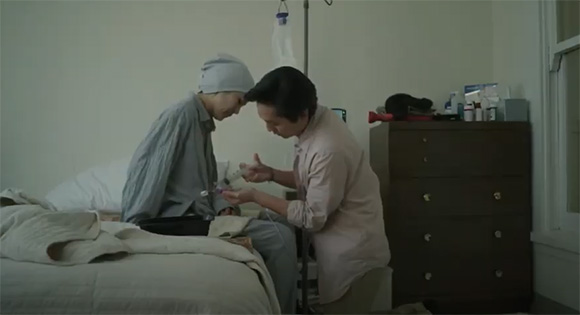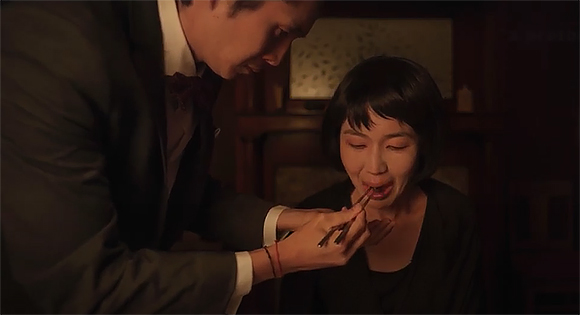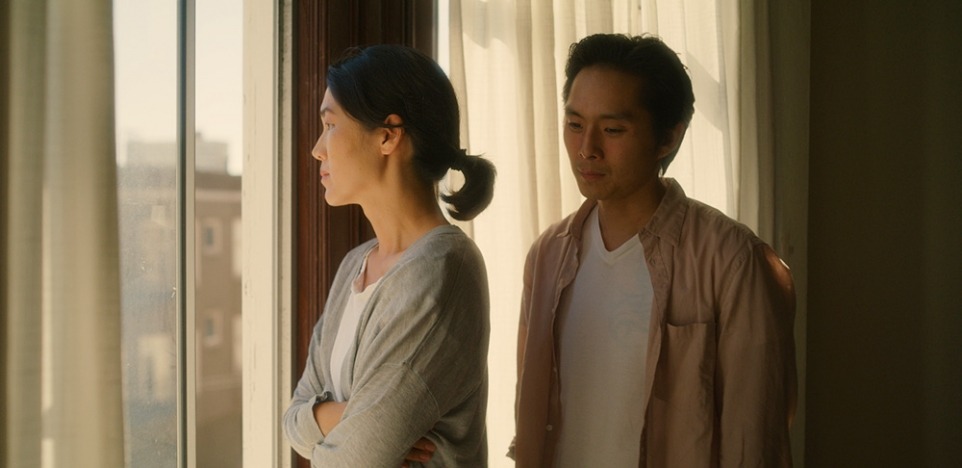"The family is inescapable. You are born into it, and it lives in you and through you to the end of your days."
— Leslie H. Farber
Chang-rae Lee (Justin Chon), a first generation Korean-American, has taken time off from his Wall Street job in New York City and returned to his family home in San Francisco to look after his mother (Jackie Chung), who is dying of cancer.
There is a bond between mother and son and also a break that cries out for healing. To honor their bond and to deal with past hurts, Chang-rae decides to prepare the traditional Korean New Year's Eve dinner his mother always made. The special dish is beef short-ribs where the thinly sliced meat is marinated in a special sauce before being cooked in the oven. The meat is left attached to the bone in order to "borrow its riches." This is a good metaphor for what Chang-rae experiences with his mother.
As narrator, Chang-rae makes it clear that cooking draws us into the present moment and also demands that we give it focused attention and time. This is what he tries to do in his caregiving.

As his mother devoted time and energy to her children, he now handles her treatments and cleans up her vomit. She made a beautiful home for the family; now he repairs a deteriorating wall. She cuddled him when he was a baby; he now holds her foot in his hand when she asks him to.
Chang-rae and his mother reminisce about his school days at Exeter and Yale when she thought he was embarrassed by her. Later she confesses that being a mother was the best part of her life.
Other people try to influence the course of events. Some church ladies stop by to convince them to follow Jesus and accept his love during this time of difficulty. Chang-rae's father (John Lie) advises him to return to his job in New York, assuring him that he will take care of his mother. His sister (Christina July Kim) flies in and immediately insists that they try some experimental treatments, but Chang-rae wants to abide by his mother's wishes.

Wayne Wang has based Coming Home Again on a personal essay by award-winning Korean-American writer Chang-rae Lee, published in The New Yorker. Our experiences, memories, and responses to family are powerful and dramatic. Chang-rae's visit home becomes a chance to work with his emotions as he relates to his dying mother, his adulterous father, and his know-it-all sister.
Near the end of the film, Chang-rae plays Leonard Cohen's much quoted song "Anthem":
"Ring the bells that can still ring
Forget your perfect offering
There's a crack in everything
That's how the light gets through."
Like Chang-rae, we must realize that our quests for perfection in the service of others -- and the failures that often occur -- can be spiritual teachers, letting in tiny glints of light. The cracks in our lives can be wonder workers if we slow down and embrace the mystery all around us. The pace of Wayne Wang's film gives us the time to do just that.
Movies by Wayne Wang
Born and raised in Hong Kong, Wang moved to Los Altos, California, in 1967. For two years he lived on a Quaker ranch, surrounded by the unique counterculture of America in the late 60s, and attended college nearby. He eventually got a Master of Fine Arts degree in Film and after a brief time back in Hong Kong, began making films in the U.S. He has made over 22 movies in 44 years. Here are some we have appreciated:
- Anywhere But Here is a heartfelt drama about a mother and daughter who are having trouble connecting.
- Because of Winn Dixie is a magical story about a lonely little girl whose life is transformed by a stray dog with a spiritual gift for bringing her together with just the right people.
- The Center of the World is a fascinating film about sexual politics and the games people play with fantasy, power, and the illusion of easy intimacy.
- Eat a Bowl of Tea explores the pressures put on two newlyweds in Chinatown to meet the expectations of their community.
- The Joy Luck Club affirms our respect for the diverse spiritual journeys of mothers and daughters.
- Last Holiday is an appealing morality play in which Queen Latifah demonstrates a warm embrace of life with just the right mixture of humor and humanity.
- Smoke reveals the invisible bonds that tie people together and provide meaning in a world of suffering, violence, loneliness, and separations.
- A Thousand Years of Good Prayers recreates a chilly reunion between a Chinese father and his American daughter who dance around a divisive family secret.
